As D.C. Attorney General Brian Schwalb had his first hearing in a lawsuit he brought against the Trump administration’s deployment of the National Guard troops, Free DC mobilized residents to the fight with a “Pack the Court” demonstration that underscored the urgency of local autonomy and D.C.’s journey to self-governance.
With rallies and events planned until the end of the year, organizers are building stronger coalitions and amping up urgency in D.C.’s fight for self-governance.
Just as Free DC, a grassroots movement that supports local self-determination, mobilized residents for the “Pack the Court” demonstration at the Oct. 24 hearing, the group’s leaders are training, protesting, building resistance movements and strategic coalitions across state lines to underscore the urgency of local autonomy and D.C.’s tumultuous road to self-governance.
Free DC Executive Director Keya Chatterjee said the increasing consolidation of power and systemic erosion of democratic norms has the country making a democratic U-turn.
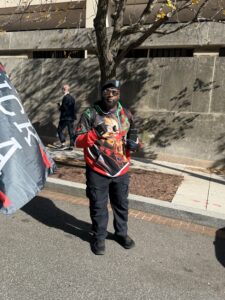
“The U.S. is a backsliding democracy transitioning to a competitive authoritarian state,” Chatterjee said.
With a five-year campaign strategy for self-rule, Chatterjee said the goal is to be strategic in every cycle of attack from this administration.
She characterized economic attacks, mass firings, National Guard deployment, local funding freezes, and legislative attacks as some examples of irreparable harm the federal government is causing residents.
Chatterjee said, with every attack on rights and freedoms, Free DC gets stronger—growing at double the speed than in years past—to build unity,
“Every effective movement is unified,” Chatterjee said.
Admitting she is clear-eyed about the challenges, Chatterjee said they have a 7.5% chance of success relying on the traditional electoral process, but by building a unified civil resistance movement, organizers believe they can increase the odds to about 50/50.
“Our end goal is to have equal representation under the law for the people of D.C.,” she said.
Pack the Court Protest
Free DC organizers say they have a sense of urgency, not seen before, as they describe a democracy that is slipping away to authoritarian rule.
Packing the U.S. District Courthouse with D.C. residents was just one of the many protests Free DC said they have planned to express the importance of the moment and the commitment to sustained activism.
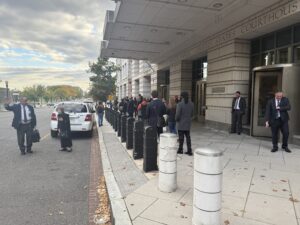
The courthouse protest started as a short walk from Constitution Avenue and rallied in front of the U.S. District Court, where they sang songs, chanted and eventually lined up to enter the court hearing.
Capitol Hill resident Randy Martin said Washingtonians are not accepting this situation, calling it “crazy” and adding that people will continue to show up.
Katie Henke, a Hill East resident who works in international development, said she has worked in authoritarian countries in Southeast Asia and Eastern Europe and the military presence on D.C. streets reminded her of those regimes.
“I don’t want to see that in our country, and so I want to stand up for my neighbors,” Henke said.
The legal battle in the courthouse
Inside the courtroom, in District of Columbia v. Donald J. Trump, D.C. Attorney General Brian Schwalb argued that the deployment of the National Guard undermined the District’s right to self-govern. He equated the deployment to an illegal occupation that is harmful to the city and its residents.
Schwalb said that the troops were not trained to do the job of law enforcement and made residents less safe.
“Today we again made clear: the U.S. military should not be policing American citizens on American soil,” Schwalb said after the hearing. “It does not make us safer to have out-of-state military—many of whom are not from here and do not know our communities—policing our streets, driving military vehicles, armed with rifles and carrying handcuffs.”
Linda Alexander, a protester who sat through the hearings, said she wanted to be fair and hear both sides. Alexander said even though she felt safer in Ward 7 since the deployment of troops, she recognized that it’s time for them to go home and spend time with their family.

Eric Hamilton, an attorney representing the Trump administration, argued that the case should be dismissed since the president has broad authorities.
D.C. is a municipal corporation with limited authority, Hamilton said, criticizing the attorney general for not aligning with the president’s position.
Accusing Schwalb of political posturing, Hamilton said, “D.C. is not a state, however much the attorney general wants to pretend it is, and he is doing damage to the District.”
Judge Jia M. Cobb is expected to make a ruling later this year.
The voices of the movement
Law student Byron Brooks said he came to the hearing to see how the process unfolds.
“We’re in an unprecedented time of democracy, or dictatorship, depending how it’s viewed. So, today’s case will definitely set the precedence on where we are headed as a nation,” Brooks said.
Matt Gordon said he saw the issue as a constitutional crisis. He said, as a veteran who has served his country, he sees the deployment as an illegal abuse of power.
Henke described the impact on her neighbors: “Poor kids are going to and from school, passing these guards with rifles bigger than their torsos. It’s disgusting. This is what you see in authoritarian countries, and I don’t want to see that in ours.”
“This is a violation of the Posse Comitatus Act,” said Gordon, a self-described angry veteran. “It’s one step closer towards an authoritarian takeover of this country.”
The Posse Comitatus Act generally prohibits the use of military for domestic law enforcement, with a few exceptions, such as protecting federal property and quelling domestic violence.
After the hearing
At a press briefing following the hearing, Schwalb said, “When this lawsuit was filed several weeks ago, I said it was D.C. today. It was going to be other cities shortly. In fact, that is exactly what has happened. This is fundamentally un-American.”
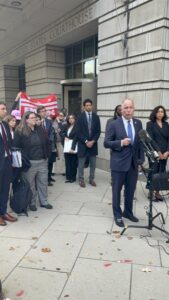
During the press briefing, Henke chanted and heckled Hamilton while holding a Free DC sign prominently in the backdrop. Chants echoed off the courthouse to disrupt Hamilton’s briefing, as he referred to protestors as a “woke mob.”
Hamilton sparred with disruptive protestors but was ultimately drowned out by chanting and walked away.
What’s ahead
The intensity and frequency of Free DC activities have surged, partnering with Virginia and Maryland affiliates to build local momentum for self-governance.
Chatterjee said that, since D.C. lacks representation, Free DC must reach out to states to build political pressure and create a network of resistance.
Chatterjee said she wants the local D.C. government to stop complying with federal demands and legitimizing illegal actions that harm D.C. residents. She said D.C. local government must be on “Team Democracy” and prioritize protecting the community over appeasing the regime.
“When you give an authoritarian regime what they want, they just take more,” Chatterjee said.
With events planned in each ward, every month until the end of the year, organizers are conducting extensive and sustained training programs and building coalitions for mass non-cooperation strategies to fundamentally reimagine democracy in the nation’s capital.
“Whether it takes ten months or ten years, we must be absolutely resolute in our fight,” said Rig, who used the moniker U.S. Army Overlord.
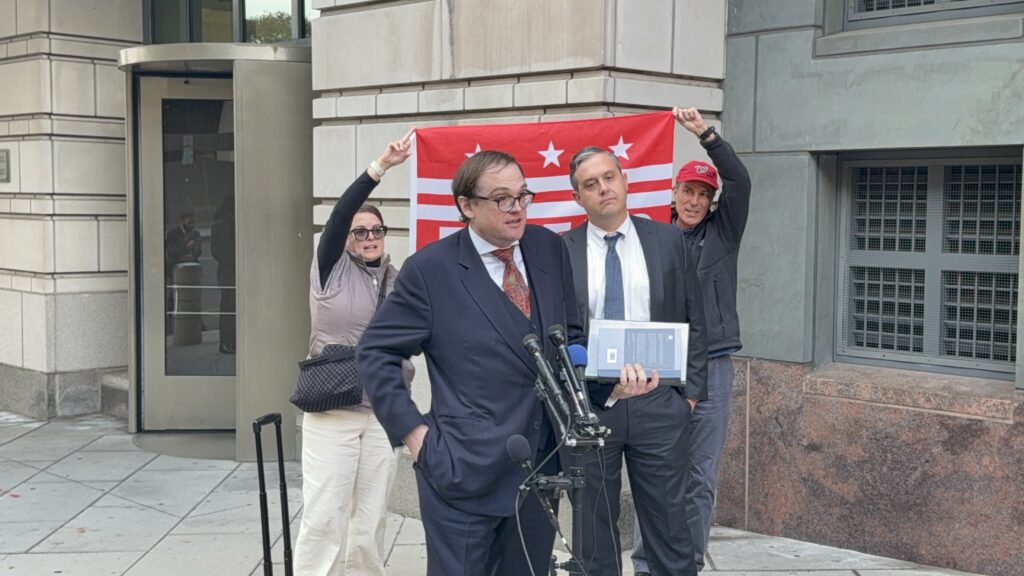
“As the government wants to escalate its attacks against the District of Columbia, we will clearly have to take more measures to withhold our support,” Henke said.
The resistance continues and prioritizes joy, community resilience, non-violent strategies, and alternative support systems as the way forward, Chatterjee said.
“There’s no oppressed people in the history of the world that have ever succeeded without joy,” she said.
“Justice looks like the military being off our streets and one step closer toward statehood,” Gordon said.

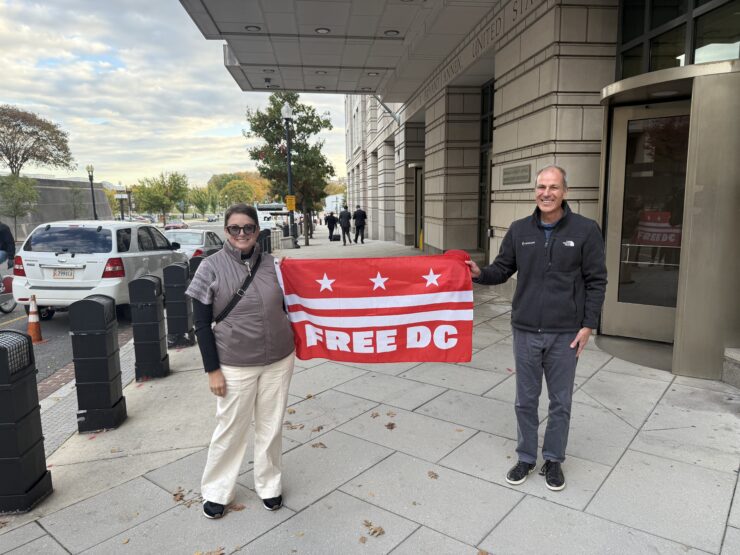
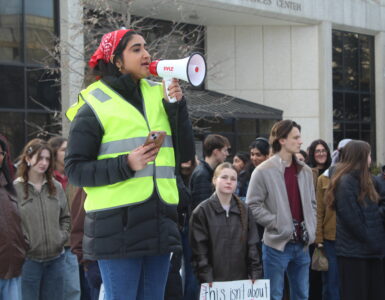












Add comment